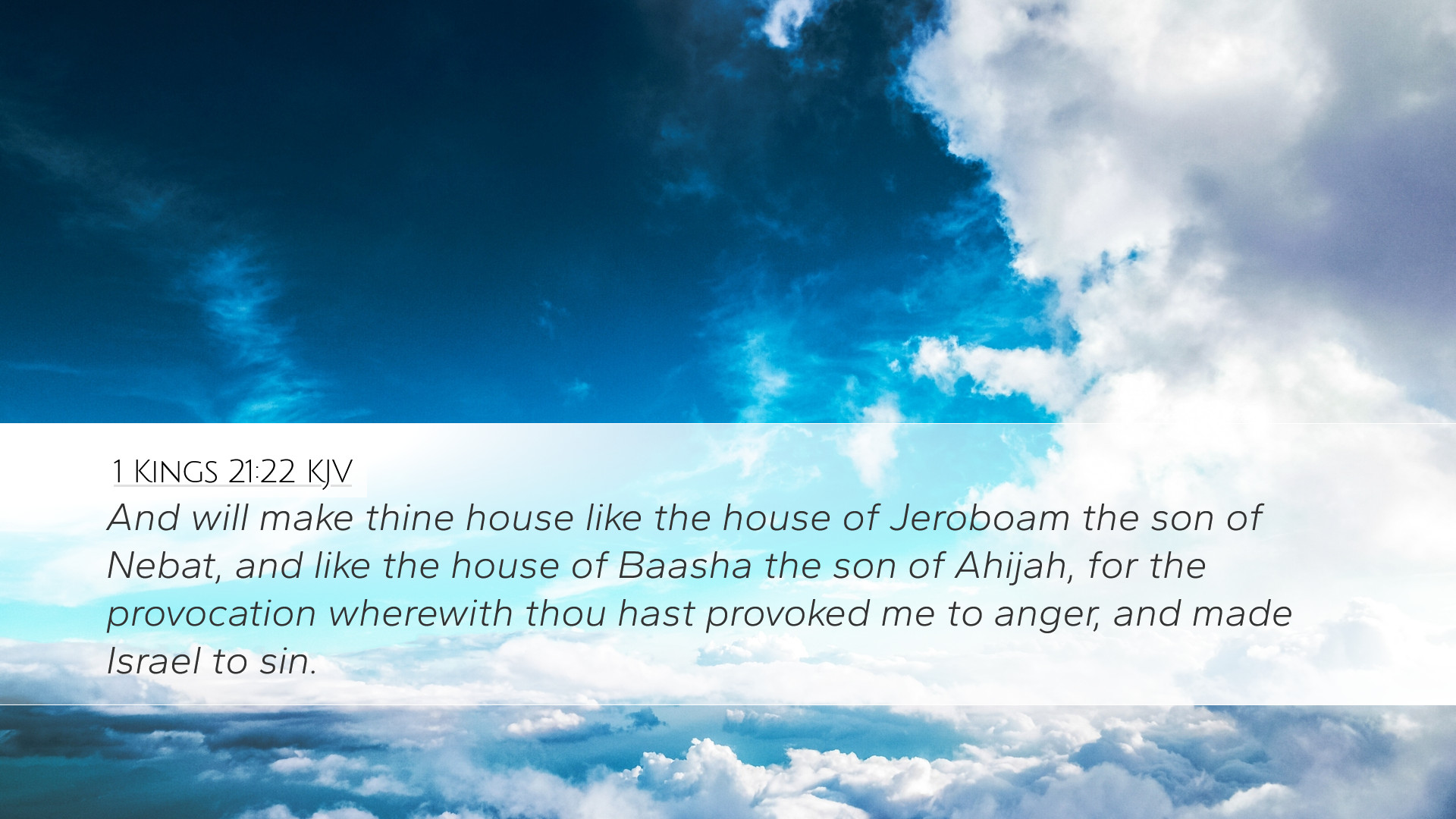1 Kings 21:22 - A Commentary for Pastors, Students, and Theologians
Verse Text: "And will make your house like the house of Jeroboam the son of Nebat, and like the house of Baasha the son of Ahijah, for the provocation wherewith thou hast provoked me to anger, and made Israel to sin."
Introduction
The passage from 1 Kings 21:22 falls within the broader narrative of Ahab's reign over Israel, characterized by idolatry and the significant prophetic ministry of Elijah. In this verse, God, through the prophet Elijah, declares judgment on Ahab and his house for leading Israel into sin. This commentary explores the depth of this warning across several public domain sources, providing valuable insights for understanding its implications for biblical leadership, divine judgment, and the nature of sin.
Historical Context
Understanding the context of Ahab’s Israel is crucial. This verse comes after the famous story of Naboth’s vineyard, in which Ahab, encouraged by Queen Jezebel, unjustly acquires a righteous man’s land. This act not only reflects Ahab’s character but also illustrates the broader spiritual decline in Israel at the time.
Insights from Matthew Henry
Matthew Henry, in his expository work, often draws attention to the moral implications of Israel's leadership under Ahab. He emphasizes:
- Divine Retribution: Henry asserts that God's judgment is not arbitrary; Ahab’s actions have directly provoked God’s wrath. His house is compared to Jeroboam and Baasha, each having faced grave consequences for leading Israel astray.
- The Severity of Sin: The listing of Jeroboam and Baasha symbolizes the complete departure from God’s ways. Ahab's sin is a reminder of how even the most powerful leaders can fall into egregious sin, inviting judgment upon themselves.
Insights from Albert Barnes
Albert Barnes provides a more detailed analysis, focusing specifically on the nature of Ahab's sins:
- Example of Leadership: Barnes elucidates that Ahab's actions serve as a warning for leaders, indicating that those in power must be vigilant in their moral conduct. The verse highlights that the implications of a leader's sin extend beyond themselves and reflect upon the entire nation.
- Historical Consequences: He further adds that the downfall of Ahab's house serves as a historical lesson for the reader—showing that sin leads to ruin, as history itself is a testament to the struggles of Israel post-Ahab.
Insights from Adam Clarke
Adam Clarke's commentary delves into the theological ramifications of this verse:
- God’s Judgment on Idolatry: Clarke emphasizes that God’s anger towards Israel's sin, particularly idolatry, is a crucial theme. Ahab’s leading Israel into idolatry incited God’s judgment, illustrating how corporate sin poses serious spiritual threats.
- Repentance and Hope: However, Clarke also offers a note on God’s mercy, suggesting that despite this severe pronouncement, there remains a pathway for repentance, indicating that God desires restoration more than judgment.
Theological Reflections
The implications of 1 Kings 21:22 extend deeply into Christian theology and ethics. Each commentator reveals significant truths regarding the nature of sin, divine judgment, and the role of leaders.
Sin and Corporate Responsibility
The passage illustrates that leaders bear a collective responsibility for the spiritual state of those they lead. Ahab’s complicity in sin led to the condemnation of his entire lineage. This principle serves as a cautionary reminder to leaders today—both within the church and broader society—of the far-reaching impacts of their moral and ethical choices.
Divine Justice and Mercy
The strong pronouncement of judgment does not negate God’s desire for repentance and restoration. While God’s justice requires a response to sin, His mercy offers hope for redemption. This duality is significant for pastors and theologians as they guide congregations through the complexities of divine justice, helping believers understand both God's holiness and His love.
Practical Applications
In light of the theological and historical analysis, several practical applications emerge for today’s readers:
- Leadership Integrity: Leaders in any capacity must strive for integrity, understanding the weight of their influence. They should actively foster an environment that encourages righteousness and accountability.
- Awareness of Consequences: Recognizing that individual actions can lead to corporate consequences can modify behavior. Believers must confront personal sins, not only for their sake but also for the sake of their community.
- Encouragement of Repentance: Churches should create cultures of repentance, where individuals understand that returning to God is always an option, even after profound failure.
Conclusion
1 Kings 21:22 serves as a pivotal verse highlighting the seriousness of sin, the accountability of leadership, and the profound nature of divine judgment. By synthesizing insights from Matthew Henry, Albert Barnes, and Adam Clarke, we gain a comprehensive understanding of the implications of this text. For pastors, students, and theologians, the lessons contained within are timeless, urging careful reflection on the moral imperatives of leadership and the offer of grace amid judgment.


